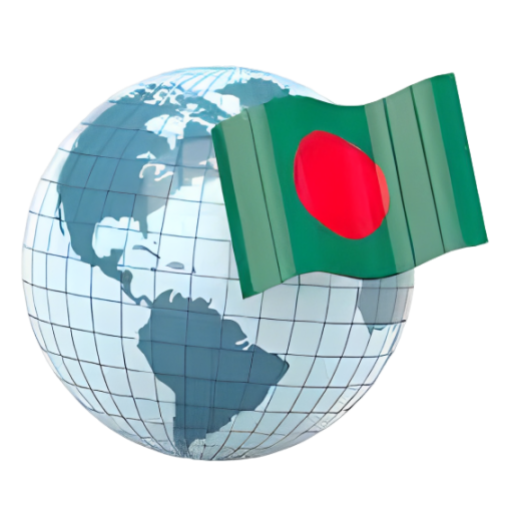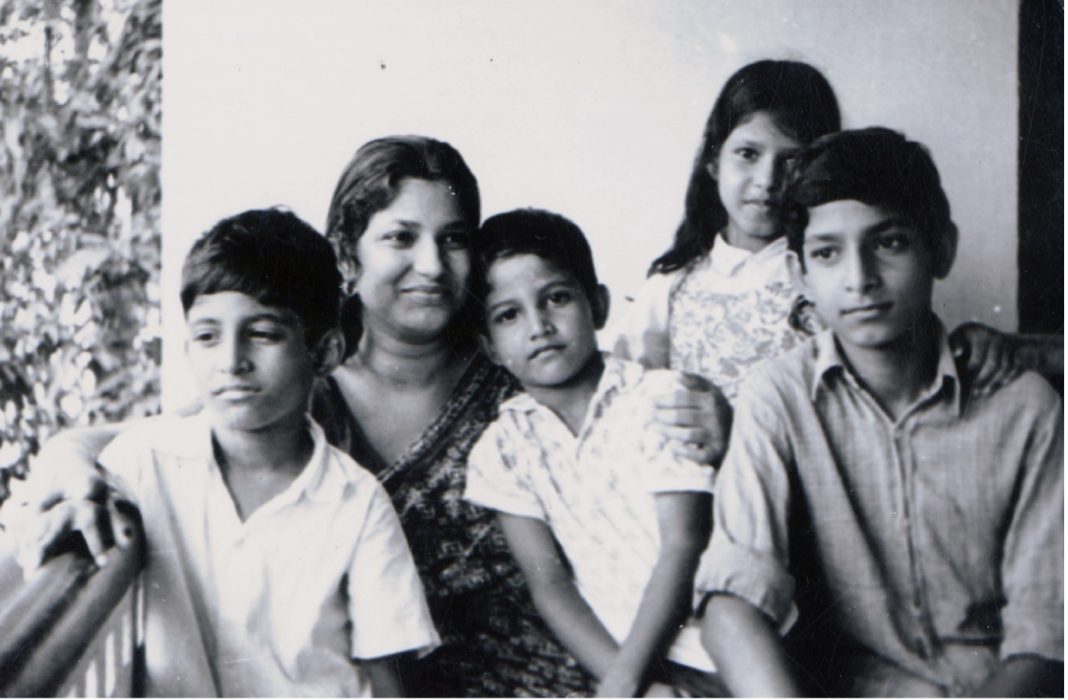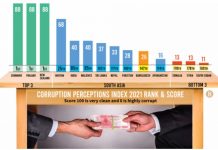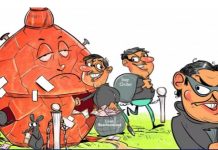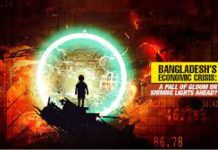My mother Mrs. Rabia Khan with all of her children from left: Mehfuz Khan, Reza Khan, Shahana Khan & myself.
The backdrop
This story begins with the arrival of a 12-year-old boy, back in January of 1974, holding his father’s hand into a country that was so distant and alien at that time. This is the story of my life, its highs and the lows, and how a young lad made through it.
My father I came to Sydney with my late father Masud Alam Khan. My mum, sister and two brothers stayed back until my father was absolutely sure that he wanted the whole family to settle in Australia. We were housed in Villawood Migrant Hostel with other newly arrived immigrants from all around the world. My dad planned to settle in Melbourne following a stopover in Sydney. However, as destiny would have it, he was convinced to settle in Sydney by a couple of Bangladeshi families. Rest of our family joined us in mid-1974.

Father and son back then
The Challenges
Starting life in a new country can provide challenges to any family from dislocation, new language, culture, climate and food platter. Unexpectedly we found Australia’s economic, infrastructural, social and environmental development well below of what we expected and experienced in Islamabad, West Pakistan during 1967-69 or Dhaka, East Pakistan of 1965-71. My father found it hard to land a suitable job in line with his experience of working with the Australian High Commission prior to coming here. He had to settle for a middle management role with the Berger Paints. Consequently, our living standard fell sharply restricting us from living in neighbourhoods with better schooling, amenities and community support including travels to Bangladesh to be with the relatives and friends.
Life for Asians back then was pretty difficult. There were about a total of 10-12 Bangladeshi families in Sydney. There were not any community or religious based support organisations to assist the likes of us. The first mosque was established in Lakemba in 1977. The only Asian grocery shop was at Bondi, run by a Jewish family from India. As there were no halal butcher shop, we would go to Camden to a research facility of the Sydney University to slaughter chickens, at a dollar for each. Bangladeshi families celebrated Eid, religious occasions and national days at the Randwick Army Barracks community hall (which has since been demolished). Everyone worked together as a team to show case the best they could. It was the beginning of formation of Bangladeshi community in Sydney.
The Highs and the Lows While at Villawood, I was enrolled at the Chester Hill High School in year 7. The following year we moved to Homebush and went to Homebush Boys High, and my two brothers and sister went to the Homebush Public School.
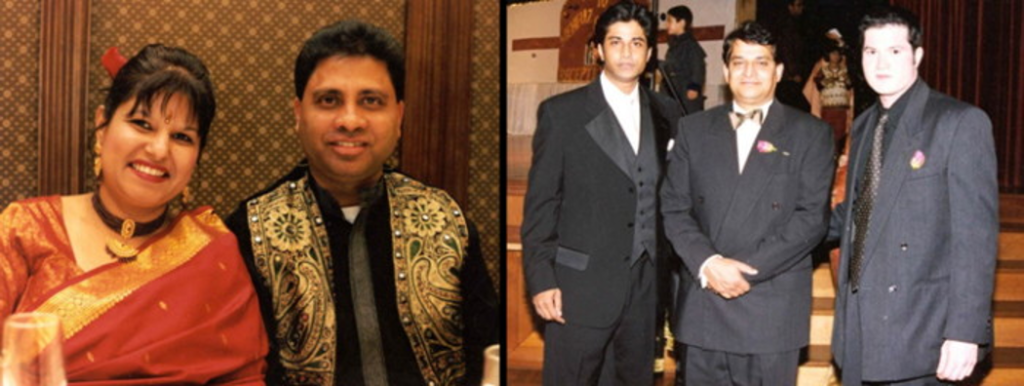
Younger sister Shahana Gazi & husband Zamal Gazi. Brothers Mehfuz Khan &
Reza Khan on my right & left.
We stayed in Homebush until the beginning of 1977 and then moved to Blackett, an outer Western Sydney suburb where I grew up to finish my secondary and tertiary studies. My sister Shahana went to the Blacktown Girls High School (Partial Selective School now) and completed her HSC there. My youngest brother Reza went to the Noumea Public School followed by the Plumpton High School where he completed his HSC. My other brother Mehfuz remained in the Homebush Public School and finished his HSC at the Homebush Boys High.
At my first school in Australia, the Chester Hill High, the first day went well with all the fanfare of being welcomed as a new student into the school. On the third day, after the designated school sports day, I received canning from the sports teacher. This was my introduction to high school in Australia even before I turned 12! He allegedly did not believe my explanation for not being able to register for the grade cricket on the designated sports day. As it happened, I could neither find him in his office nor in the field. My attempt to see the principal also failed as he was busy in a meeting and after that I finally went home.
At a later time, couple of white boys snatched our tennis/cricket ball while playing in the school ground. I confronted them and threatened to report to the teacher. As a consequence, while returning home, I was pounced and yelled at “Blackie go home, we don’t want your kind in our country”. I took cover in a nearby news agency. The kind shop owner drove those goons away and protected me. From then on, I have been called various names, spat at, various items from school bag had been stolen and verbally threatened. As I never experienced these kinds of verbal threats, bullying and torments back in Dhaka it was very difficult to cope with; but I kept this all to myself so that my father was not emotionally hurt of our experience.
While in Year 9, I explored in vain to find some casual work to supplement some of my educational expenses and a bit of pocket money. Finally, I sought the help of my father who took me to the manufacturing plant of the Berger Paints during my holiday. The Operations Manager, a very nice white gentleman took time to teach me to mix, prepare and dispatch specialised car paint according to the orders. I quickly learnt through their instructions and got down to work alongside two other white male co-workers. Lo and behold, those two workers decided to walk out of the job after the morning tea break! Needless to say, that they refused to work next to a non-white Muslim boy. However, after much persuasions by the Operations Manager, they finally returned to work and things went without any further hitch.
I am glad that Australia has come a long way since, due to the forward and wise thinking on the part of some of its leaders. I think we also played our parts to bring about that change through our contributions to the society. In spite of Australia’s Commonwealth and States and Territories Anti-Discrimination Acts (Australian Human Rights Commission Act 1986), subtle discrimination still exists as one gets to experience it more and more as you move up the ladder to higher positions of responsibility. I have experienced this at my place of work at the Australian Taxation Office (ATO).
I actively participated in school activities including grade sports. Our school was well known for excelling in sports. We toped twice in the 1st Grade Baseball and came second once against other competing schools.
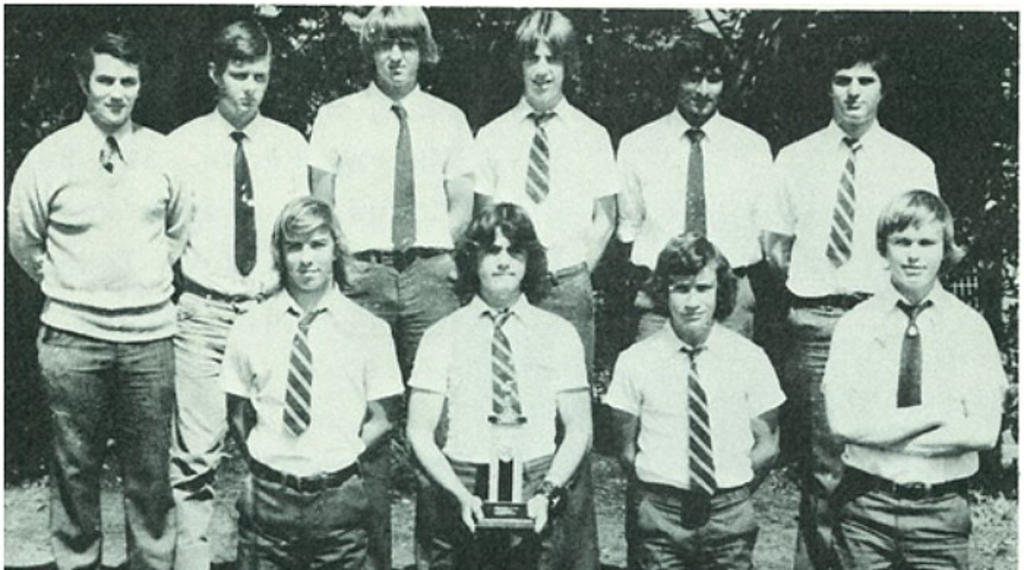
1st Grade Baseball Team, 1977-78, Homebush Boys High School.
Myself 2nd from left 2nd row.
Notwithstanding my success in sports, my academic performance in the school remained quite ordinary. There were two milestone events that changed all that. First, at the end of Year 9 (1976) my father called me in the lounge room to discuss my school report. I knew that except for Maths I had not performed well. I was ready for the worst, knowing how much importance he gave for our education. However, I was not ready for what happened next. Instead of strong verbal feedback or belting, my father wept. He told me that he had high hopes for all of us. He brought us to Australia so that we could have access to high standard of education and seize the opportunities that he could not get during his orphaned days. He wished for us to go on to the university. I knew that I let him down. I vowed to double my efforts to improve the results.
The Second occurred when I took the test conducted by the NSW Department of Education to assist Year 10 students on their career directions. I was cautioned that it is a very difficult multiple choice IQ type test. After the computer evaluation of my answer sheet, I was informed that there seemed to be some error and it needed to be remarked. Later they quired me if I took the same test before, which I did not. The career adviser thought that the result did not seem right as it was the highest score anyone had achieved in the whole of Western Sydney region!
He wanted to know what was my career goal. I informed him a professional career in economics, finance, commerce or computing. Claiming himself to be a specially trained career adviser to the Year 10 students, he recommended (irrespective of my test score) that people of my background succeeded in manual blue-collar work such as carpentry, boiler making or auto mechanic etc. I thought for many months whether I should follow his advice but it was my father’s aspiration and my self-believe that I continued to undertake my HSC studies with the goal of gaining an opportunity to go to the University. I came in the top 5 per cent in 1979 HSC and secured an offer to study Bachelor of Economics at the University of Sydney. I have since completed a Masters of Statistics degree from the University of NSW, post-graduate degree in Accounting from the University of Canberra and Certified Practising Accountant status.
Reflecting back on the career advice given to me, I often wonder, was it institutional discrimination or one man’s personal view against the Asians? Whatever it might be, it seemed to have worked as I was the only coloured student in the school from Year 8 onward to have completed the HSC.
Growing up as a teenage boy in Sydney was as lonely as it could be as there were not as any Bangladeshi boys of my age. Often, I had to sit quietly among the adult males in social gatherings. However, I did manage to make some local friends in the neighbourhood and in school. Good for me that, all this changed when the BIMAN/QANTAS boys arrived in 1979. I often played Sunday cricket with them and some of them remained close friends and acquaintances over the years. Thanks to uncle Muhammad Alamgir and Mostafa Abdullah for organising and taking part in those weekend events with us.
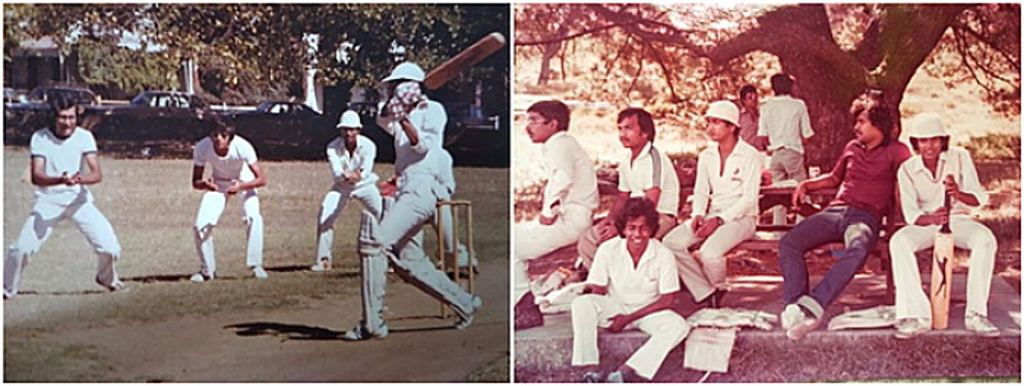
With Biman Boys at the weekend cricket.
Work
After finishing my postgraduate studies, I commenced my career in 1984 with the Australian Bureau of Statistics in Sydney. I followed the advice of some elders that career with Australian Public Service were the best choice for people from an ethnic background. Following this, I moved to Canberra in 1986 to join the Bureau of Industry Economics (BIE), Department of Industry, Science, Energy and Resources as a Research Economist. After three years with the BIE, I secured a promotion with the Australian Taxation Office in 1989.
I have remained with the ATO since then and presently work as one of its Executive Director. My career in the National Office of ATO has been very satisfying and rewarding. It has allowed me to work with national revenue agencies from the US, the UK, Canada, Japan, New Zealand and the OECD and the IMF. I have also had the opportunity to work on several Commonwealth budgets with some of the best Treasurers that Australia has ever produced namely; Paul Keating and Peter Costello. Internationally, the ATO is placed in the top 3 revenue agency in the world. One of my career highlights has been working closely with tax partners from Big 4 accounting firms, representatives from professional associations and industry bodies.
My parents and their engagement with the society My late father was highly instrumental when it came to building the social infrastructures for Muslims in Western Sydney. Following the opening of the Lakemba Mosque in 1977 he convened a meeting at our house in Blackett in 1977 to float the idea of buying a property in Western Sydney for the purpose of building a mosque.

The Rooty Hill Mosque
That was the birth of the Rooty Hill Mosque. It used to be a tiny 3-bedroom fibro house where we prayed all our prayers including the Jum’ah and Eid congregations. From a humble beginning with generous donations and hard work of many people we now have one of the largest mosques in the Western Sydney.

My parents
Following the success of the mosque, he floated the idea of the need for a Muslim graveyard in the Western Sydney. With the assistance of Uncle Kazi Ali and others, they actively lobbied with the Blacktown council for allocation of land for Muslim burials. This saw the allocation of a sizable land to accommodate over 1,000 graves in the existing Riverstone Cemetery. After the land was allocated, it was a requirement that weeds and grass were kept to minimum to minimise potential bushfire hazard threating the adjacent community.
My father with few others would regularly volunteer to keep the grounds clear of grass and weeds. At an instance someone asked my father whether it was worthwhile keeping the burial site as no Muslims had been buried there as of 2002. As my father took refuge from the hot sun under a nearby tree, he replied; Allah willing, I may the first one to be buried here. As providence would have it, he was the first Muslim to be buried under that same tree on Monday the 24th of February 2003.

Following handful of burials in 2003, the Muslim section of the cemetery is almost full by 2021.
Apart from these my late father would often assist newly migrated Bangladeshi families with guidance and household essentials. He would often visit community members who were in hospitals to provide emotional support.
Following my father’s sudden death my widowed mother continued her charitable and religious work both in Sydney and Dhaka. She has assisted many new Bangladeshis with her own experience of how to best settle in Sydney, and raise children during their difficult teenage period. She emphasised the importance of education including assisting to find compatible partners for their grown-ups. She has also established a charity infrastructure in Dhaka to distribute food, clothing and essential resources to needy families who have been impacted by natural disasters including COVID-19, assisting orphaned children, parents to fund their daughters’ wedding and financially grieved women impacted by divorce or death of their husbands. She funds these programs by selling clothing, arts and craft items, and collecting donations from community both here and abroad.
My parents have been a role model in our lives. Following their footsteps, I have attempted to the best I can to help the community in Canberra and Sydney. I feel blessed that I could make some humble contributions towards the realisation of the Canberra Islamic Centre. The vision was to develop an Islamic cultural centre, which could serve the on-going social, spiritual, recreational, welfare and religious needs of the ACT and the regional community. The vision became a reality in 1994 when the first stage of the complex, centre hall was constructed. My specific contribution was to encourage others to take part in the project, secure tax deductibility for donations to the library, become a foundation member and assist with monthly gathering which included organising and delivery of lectures and annual Ramadan community-based dinner events.
Knowledge has been dear to my heart throughout my professional career given our experience with primary and secondary education in Sydney. In this regard importance of quality education and how to excel in it has been something I have been sharing with broader community to help assist their parents and children that my parents did not receive. I hope to deliver further topics through Podcasts and other mediums for the benefits of Bangladeshi community in the future.
Like my father I have also provided new migrants with career and educational advice, how to apply for jobs, where to look for vacancies, assisted many with drafting their cover letters, resume and at times provided referee references. I have done the same with work colleagues from the Indian Subcontinent too.
Through my professional career I have also acquired extensive knowledge and expertise in digital transformation, Robotic Process Automation and Artificial Intelligence. I have published well over 30 papers on my LinkedIn site and Tech magazines. I have chaired several conferences, moderated panel discussions and delivered papers. One may access most of those by google search of my professional name Mike Khan, CPA. I am open to sharing the knowledge if it may help others.
Retrospective thoughts
An objective evaluation of our decision to migrate to Australia against expected benefits such as higher quality of life measured by education, health, life expectancy, employment/business, security, religion, culture and general acceptance by the people of the new country; there bound to be few positive as well as some negative findings against each of the sub-criteria. My personal overall assessment tends to be negative. I consider, we would have been better-off in Bangladesh.
Australia’s prevailing socio-economic conditions coupled with the lingering institutional discrimination in the 1970s and the 1980s had negatively impacted our family to a great extent. My two younger brothers suffered the most. It impacted their development and general outlook of life. This was a significant price that no migrant family should endure today.
To our decedents, I would say: keep your heads high, be proud Australians. What you have is what you earned. Uphold the values and teachings of your ancestors. Maintain ties with your family and friends from back home. Do not close the ties with your motherland because only after passing of time you will realise its worth. Keep your culture and religious values intact as they will determine the true identity of your children and grandchildren.

My Family
This is my journey to Australia that spans from 1974-2021. I dedicate this journey to my loving parents who we dearly love. They sacrificed their lives at their prime so that we could have a better future in a new country. I pray to Allah that when he extinguishes their life on earth that he admits them into the Paradise for all their sacrifices and good deeds.

Mehmood Khan (Professionally known as Mike Khan) has over thirty years of senior management experience in the Australian Public Service. Mehmood presently works as an Executive Director in the Australian Taxation Office. He is an accomplished leader in organisational transformation through development and implementation of innovative client service, organisational review and development, planning and reporting, staff capability development, knowledge development, change management, performance improvement, compliance management, finance and risk management strategies. Mehmmod has postgraduate qualifications in economics, statistics and accounting from University of Sydney, NSW and Canberra.
